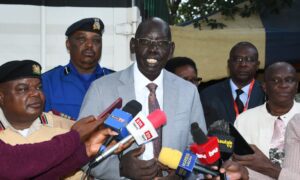Trans Nzoia Governor George Natembeya Charged with Corruption in Sh3.2M Kickbacks Scandal
Trans Nzoia Governor George Natembeya is at the center of a storm after being arraigned at the Milimani Anti-Corruption Court over serious corruption-related charges. The Ethics and Anti-Corruption Commission (EACC) has accused the Governor of conflict of interest and the unlawful acquisition of public property, throwing the former Rift Valley Regional Commissioner into the national spotlight once again—this time for all the wrong reasons.
Appearing before Principal Magistrate Hon. C.N. Ondieki, Governor Natembeya denied all charges levelled against him. The court, however, granted him a bond of Ksh1 million with one surety or, alternatively, a cash bail of Ksh500,000. In a significant development that could paralyze county operations, the court also issued an order barring the Governor from accessing his office for 60 days. Moreover, he is not allowed to leave the country as investigations intensify.
Details of the Alleged Kickback Scheme
According to documents presented in court, the EACC alleges that between January 1, 2023, and April 30, 2025, Governor Natembeya received kickbacks amounting to Ksh3,252,568. These funds were allegedly funneled to him through intermediaries by one Mercy Chelangat, the Director and Proprietor of Lyma Agro Science Limited and Maira Stores—companies that had secured contracts with the County Government of Trans Nzoia.
Investigations reveal that the funds were initially received by a Mr. Masungo, who then transferred the money to the Governor via M-Pesa. In what appears to be a complex laundering scheme, Masungo is said to have operated a bank account at SBM Bank under the company name Easterly Winds Limited. This company reportedly received payments from the county government and later redirected the funds to the Governor.
The EACC, in a detailed report, concluded that these transactions demonstrated a clear case of conflict of interest and abuse of office. The case file was later forwarded to the Director of Public Prosecutions (DPP), who reviewed and approved the charges, paving the way for the Governor’s arraignment.
Separate Investigation into Kes 1.4 Billion Procurement Scandal
In what could deepen the Governor’s legal woes, the EACC has confirmed that this case is just one piece of a larger puzzle. A parallel investigation is underway involving the Governor and four other individuals in connection with irregular procurement and fictitious payments totaling Ksh1.4 billion during the Financial Years 2022/2023 and 2024/2025.
On the eve of his court appearance, EACC detectives carried out a dramatic search operation targeting the homes and offices of Governor Natembeya and his close associates. The raid is said to have yielded vital documents and electronic evidence believed to be linked to fraudulent procurement deals.
Preliminary findings suggest that Governor Natembeya may have used his position to influence the awarding of tenders to companies closely associated with him. These tenders, according to the EACC, were allegedly overpriced, irregularly awarded, and in some cases, involved ghost projects that were never implemented.
EACC’s Ongoing Crackdown on Corruption
Speaking after the arraignment, an EACC spokesperson stated, “The Commission remains resolute in its commitment to fight corruption and ensure that public resources are protected from unscrupulous individuals, regardless of their political or social standing.” The spokesperson added that further arrests and prosecutions could follow once ongoing investigations are concluded.
The EACC has in recent months increased pressure on county governments, warning that devolution should not be turned into a vehicle for personal enrichment. According to the commission, procurement fraud, conflict of interest, and bribery are among the most prevalent forms of corruption in devolved units.
Political Reactions
The arraignment of Governor Natembeya has sparked sharp political reactions from both his supporters and critics. While his allies maintain that the charges are politically motivated and aimed at derailing his development agenda, critics argue that the law must take its course and that no one is above accountability.
A section of Trans Nzoia MCAs has already called for an emergency sitting to deliberate on the implications of the court order barring the Governor from office for 60 days. If enforced strictly, the order may require Deputy Governor Philomena Kapkory to assume acting responsibilities during the Governor’s absence.
Some leaders are also pushing for the Senate to intervene and provide oversight amid growing fears that the county government may grind to a halt.
Legal and Administrative Implications
Legal experts indicate that the court’s decision to bar Governor Natembeya from accessing his office could have far-reaching implications. “The Governor remains in office legally, but functionally, he is suspended. That creates a leadership vacuum unless immediate administrative arrangements are made,” said constitutional lawyer Stephen Njoroge.
The cash bail condition and travel ban mean that Natembeya’s movements and official functions will be significantly restricted as he battles the graft charges.
What Next?
Governor Natembeya is expected to return to court in the coming weeks for the mention of the case. Meanwhile, the EACC is continuing its probe into the broader corruption allegations, including the irregular Ksh1.4 billion procurement saga.
The developments have added Natembeya to the growing list of high-profile governors and senior county officials under investigation or facing prosecution for corruption since the advent of devolution in Kenya.
As the investigations proceed, Kenyans will be watching closely to see whether this case marks a turning point in the fight against corruption in county governments—or just another political drama that ends in a whimper.
For now, the Governor’s fate lies in the hands of the judiciary, and the spotlight remains firmly fixed on Trans Nzoia.



















